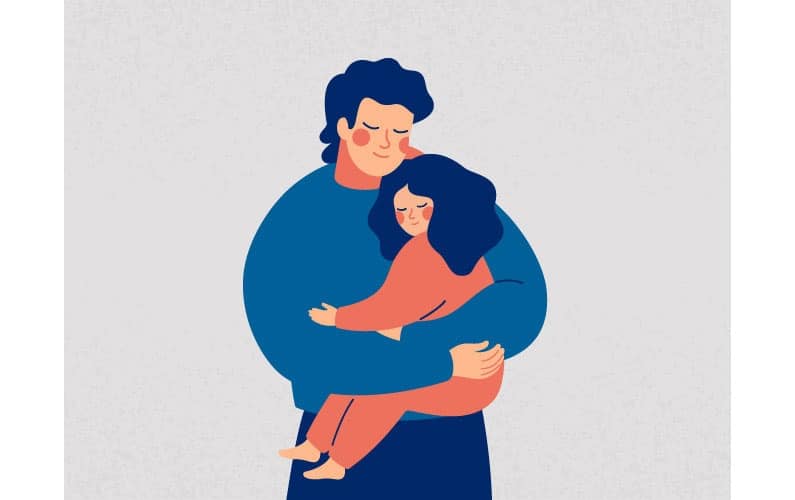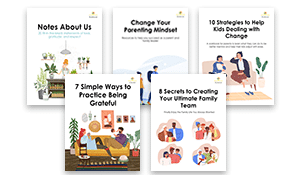“TMI, Dad!”
Have your kids ever said that to you? Too much information. How could I share too much information? Isn’t it my job to tell them about the world? Shouldn’t they know all about me and my experiences? Isn’t that how I create a strong parent-child relationship? Apparently not.
Getting the TMI card thrown at you can be so shocking and insulting. The hard part is the line is different with every child.
Having raised four adult children myself, I’m very familiar with the look of horror or the ever-present eye roll of embarrassment that can come from overstepping the ever-changing line about how much my children need to know about me.
You’ll navigate those waters with your own children. I wish you all the best and stand in solidarity for when it’s implied you, too, are a terrible person and purposefully trying to inflict damage on your child for sharing details about your life unfit for their precious ears.
It’s just another joy of parenting.
The good news is there are actually three things your child unequivocally needs to know about you to have a strong parent-child relationship with them. And I promise when you share them, you won’t ever get the TMI card thrown in your face. These three things will also be central to your child being a caring and thoughtful person. In addition, they will contribute to them becoming more responsible human beings and trusting of you for support and advice when they really need it (teenage years, anyone?).
Trust Is Key to Your Parent-Child Relationship
Have you ever become frustrated with your kids when they can’t communicate exactly what they’re feeling? Perhaps a better question would be, when was the last time that happened to you? It’s a common feeling among parents. We want to help, but when they can’t just say what the problem is, we get desperate and frustrated and, on occasion, rather angry.
It takes many years of practice and brain development for children to begin processing things in what we’d call a logical way. And I’m sure we can all name a few adults in our lives that still struggle to share what they’re really feeling.
In those moments of utter frustration when your child won’t stop asking “why,” have you ever responded to your child with “because I said so” or “because I’m your father”? If you have, you’re not alone. But it’s not a great relationship-building tactic in the long term. In fact, used frequently, it’s pretty damaging.
“Because I said so!” is just as confusing an answer to a child as their tantrums are to us. Think back to your own childhood. Was that a statement you heard often? Though it may quiet a tense situation temporarily, it does not solve anything. Ultimately, statements like this only serve to reinforce a power dynamic—parents are in charge; kids must follow the rules.
The one characteristic we actually need to reinforce in our parent-child relationship is not who’s in charge but rather how much you can trust each other.
The communication breakdown that so frequently happens with teenagers comes from a lack of trust in their parents.
If you want your child to come to you with their problems when they’re a teenager, instead of Google or their equally questionable friends, you need to work on developing and maintaining their trust now.
Develop Trust by the Way You Communicate
Trust is inherent in the parent-child relationship. Children really don’t have a choice after all. They depend on us for survival. Unfortunately, as parents, we do all kinds of things over time to erode that trust.
Like one little wave washing away a layer of sand on the beach, each time we don’t actually turn that car around when they don’t stop yelling in the back seat, they see we don’t always mean what we say. When we consistently ask them to wait 5 minutes till we finish this email and then take 15 or 30 minutes to get back to them, they see we don’t really keep our word.
When we demand apologies from them but refuse to apologize ourselves or ask them to talk about their fears and vulnerabilities but won’t share our own, they feel the imbalance in the relationship.
Do you want your child to believe you when you say something? Then you need to do your best to keep your word. Do you want your child to be okay with failure and believe you when you say you know how they feel? Then you need to apologize when you’ve messed up and share your failures and vulnerabilities freely.
Do you want your family to stay close as they grow older and have families of their own? Then you need to create a sense of respect, openness, and team spirit within your family.
The 3 Things Your Child Needs to Know about You
To achieve that sense of respect and general trust in your family, there are three things your child needs to know about you as their parent.
- They Can Trust You with Their Secrets
- Your Love Is Not Dependent on Their Behavior
- Their Feelings and Opinions Matter
When your children know these three things about you, you can be sure that when they have problems or make choices that could have been better (remember, we all did as kids), they have someone they can talk with (you), that they know will always love them, who will provide perspective and insights that will help them move forward.
These are skills outlining what it takes to have a strong parent-child relationship. They’re all about your kids learning what it means to be a caring, thoughtful, and responsible person and, as they see you model these traits, that they can rely on you to be there for them no matter what. They also form the basis for other long-term relationships they will have in their life, especially future partners.
01 – They Can Trust You with Their Secrets
But sometimes, these secrets should be told to a parent, and we want to make sure our kids know they can tell us anything. This is all about TRUST within our parent-child relationship.
Think about the challenges children face today … someone is bullying them, they receive a provocative message on the internet from a supposed friend (i.e., potential predator), or maybe someone touched them inappropriately. Maybe they know of something dangerous or illegal happening amongst their peers.
These are all real issues that happen more often than we care to imagine. Some kids might be embarrassed. Some might be afraid. But if they don’t trust us with their secret because they believe they’ll be punished, then no one is the better for it.
If we build the foundation of trust when our children are young, they will trust us with real challenges and real secrets when they are older. They will also trust us with potentially embarrassing issues, and the door will be open for real discussions to happen. We’ll then be able to talk with them as only a parent can about the right actions that need to be taken in certain circumstances.
03 – Their Feelings and Opinions Matter
If your goal is to build a long-lasting foundation of trust with your child, then listening to (and embracing) their feelings and opinions is absolutely necessary. Even if their feelings don’t make any sense to you or their opinions are based on bad information or are totally unhelpful, you’ve still got to listen.
Listening involves opening your ears and shutting your mouth. Only open your mouth to ask questions. Don’t shut your children down before they can express themselves.
When you see your child experiencing a big emotion, it can be helpful to say, “It looks like you’re feeling (state the emotion). Do you want to talk about it?” When we help them put a name to what they’re feeling and are genuine when we ask if they want to talk about it, they’ll see that their feelings matter to us.
When it comes to their opinions, we need to give our kids opportunities to share them. If they don’t readily share their opinion, ask for it.
If something is going on in the family or the family is planning or thinking about something, ask what your child thinks about it. When they see that they have a voice in family matters, they will learn not only that their opinions matter to you but also that your family is truly a team.
Strong Parent-Child Relationships Create Capable Adults
When you have the skills to establish and maintain these foundational characteristics of your parent-child relationship, not only will your bond with your children grow but also the relationships they develop with others will be strong and enduring.
Knowing how to have healthy relationships will enable them to be successful, caring, and capable adults.
What To Do Next
1. Read more in the blog:
The Family Wisdom Blog shares valuable ideas across diverse topics.
2. Explore the Printables Library:
Our printables library is filled with must-have activity ideas, checklists, guides, and workbooks.
3. Subscribe to Our Newsletter:
Sign up for our newsletter for parenting tips to help you create the family team you've always wanted.
Our Gift to You
Printables Library
Explore our collection of guides, checklists, e-books, and more all created with your family team in mind.
Rick Stephens
Rick Stephens is a co-founder of Raising Families. With 33 years of experience as a top-level executive at The Boeing Company and having raised four children of his own, he is able to support parents and grandparents by incorporating his knowledge of business, leadership, and complex systems into the family setting.
In his free time Rick enjoys road biking, scuba diving, visiting his grandkids, and generally trying to figure out which time zone he’s in this week. Read full bio >>








